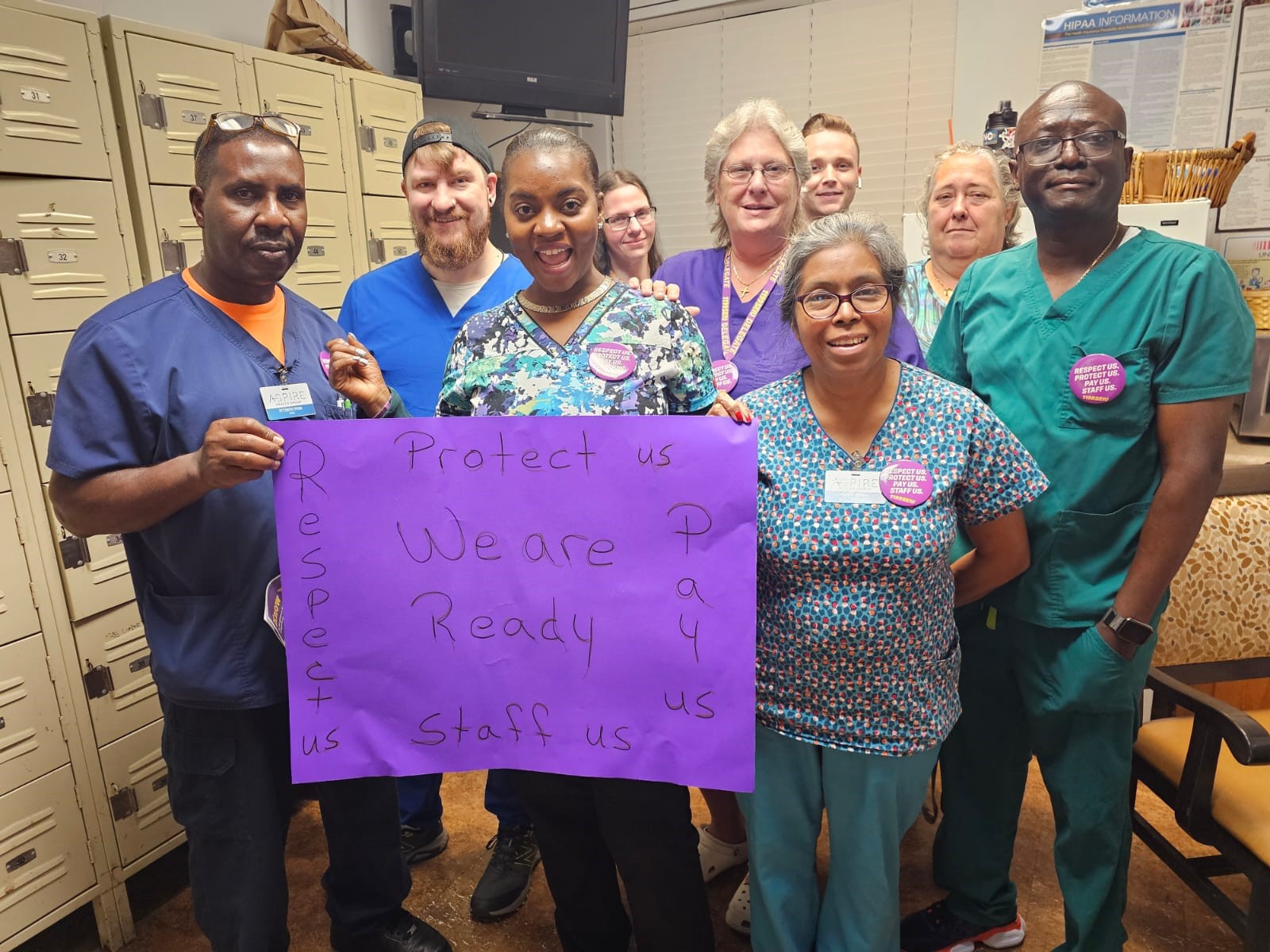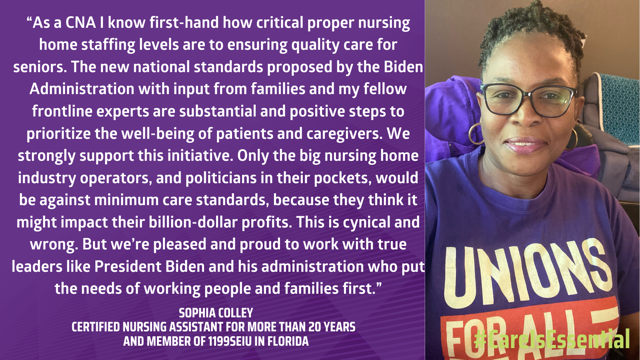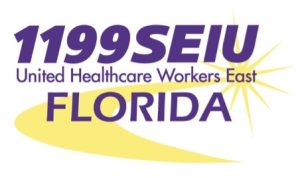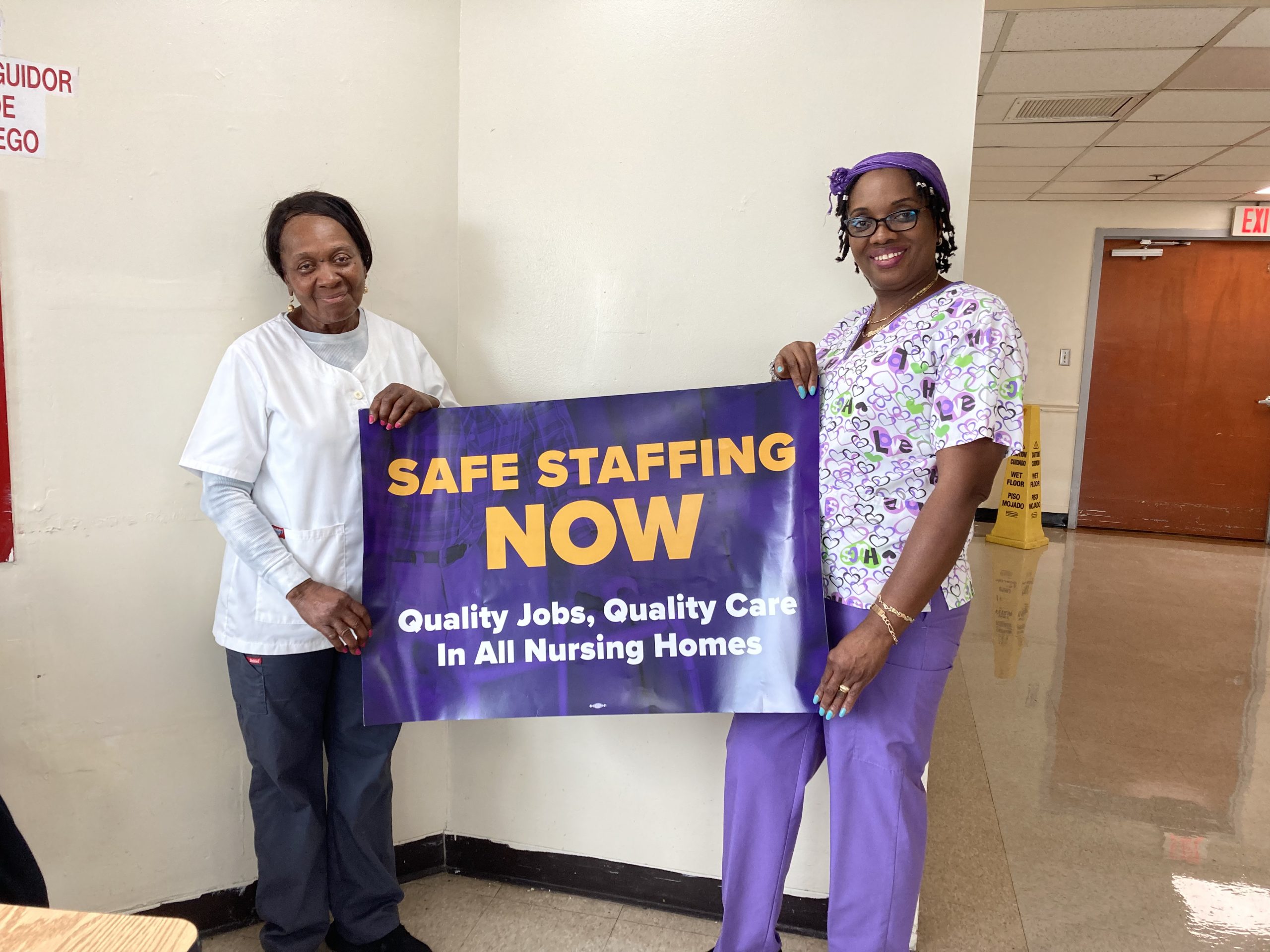On September 1, 2023, the Centers for Medicare & Medicaid Services (CMS) issued the Minimum Staffing Standards for Long-Term Care (LTC) Facilities and Medicaid Institutional Payment Transparency Reporting proposed rule, which seeks to establish comprehensive nurse staffing requirements to hold nursing homes accountable for providing safe and high-quality care for the over 1.2 million residents receiving care in Medicare and Medicaid-certified LTC facilities each day.
Ensuring that beneficiaries receive safe, reliable, and quality nursing home care is a critical function of the Medicare and Medicaid programs and a top priority of CMS. The COVID-19 Public Health Emergency (PHE) tragically caused unprecedented illness and death among nursing home residents and workers. The PHE also exacerbated staffing challenges experienced in many facilities and further highlighted disparities in care and outcomes. Despite existing requirements that facilities provide sufficient levels of staffing in LTC facilities, chronic understaffing remains a significant concern.
The proposed rule consists of three core staffing proposals: 1) minimum nurse staffing standards of 0.55 hours per resident day (HPRD) for Registered Nurses (RNs) and 2.45 HPRD for Nurse Aides (NAs); 2) a requirement to have an RN onsite 24 hours a day, seven days a week; and 3) enhanced facility assessment requirements. The proposed rule also includes a staggered implementation approach and possible hardship exemptions for select facilities. This proposed rule results from a multi-faceted approach aimed at determining the minimum level and type of staffing needed to enable safe and quality care in LTC facilities. This effort included issuing a Request for Information (RFI) in the FY 2023 Skilled Nurse Facility Prospective Payment System Proposed Rule, hosting listening sessions and extensive engagement with various interested parties, conducting a 2022 Nursing Home Staffing Study, which builds on existing evidence and research studies using multiple data sources, and reviewing recent years of Payroll-Based Journal System staffing data. CMS also considered how the proposed minimum staffing requirements would align or interact with ongoing CMS initiatives and programs that impact the LTC community. Information gathered from each of these facets was used by CMS in the development of the proposed requirements that would ensure all nursing home residents are provided safe, quality care.
This proposed rule would also promote public transparency related to the percentage of Medicaid payments for services in nursing facilities and intermediate care facilities for individuals with intellectual disabilities that are spent on compensation to direct care workers and support staff. The Medicaid institutional payment transparency provision is intended to align with a similar transparency provision focused on specific Medicaid home and community-based services in the Ensuring Access to Medicaid Services proposed rule (CMS-2442-P), published in the May 3, 2023, issue of the Federal Register.
Additionally, CMS announced a national campaign to support staffing in nursing homes. CMS will work with the Health Resources and Services Administration (HRSA) and other partners to make it easier for individuals to enter careers in nursing homes, investing over $75 million in financial incentives such as scholarships and tuition reimbursement. This staffing campaign builds on other actions through the HHS Health Workforce Initiative, including the recent announcement that HRSA awarded more than $100 million to train more nurses and grow the nursing workforce.
Establishing Minimum Nurse Staffing Standards
Staffing in LTC facilities has remained a persistent concern, especially among low-performing facilities that are at most risk for providing unsafe care. CMS believes that national minimum nurse staffing standards in LTC facilities, the adoption of a 24/7 RN requirement, and enhanced facility assessment requirement (as discussed later in this fact sheet) are necessary at this time to protect resident health and safety and ensure their needs are met.
Therefore, CMS proposes individual minimum nurse staffing standards for LTC facilities of 0.55 HPRD for RNs and 2.45 HPRD for NAs. However, these thresholds are minimums; while these proposed minimum standards, if finalized, would be applied across all LTC facilities, CMS also expects facilities to staff above these minimum baseline levels to address the specific needs of their unique resident population based on the facility assessment and resident acuity levels.
CMS is soliciting comments on alternative policy options that should be considered for establishing minimum nurse staffing standards. Based on the proposed policy presented in this rule, CMS is seeking feedback regarding whether alternative policy options would be better suited to meet and maintain acceptable quality and safety within LTC facilities, with consideration for external factors affecting staffing.
Specifically, CMS is seeking comment on an alternative total nurse staffing standard of 3.48 HPRD, among other alternatives, within which there would still be 0.55 RN HPRD and 2.45 NA HPRD minimums. Facilities would have to meet the individual standards for RNs and NAs, i.e., 0.55 and 2.45 HPRD, respectively, as well as the 3.48 HPRD, for total nurse staffing to be considered in compliance. Lastly, we seek comments on the benefits and tradeoffs of different standards, evidence, or methodologies states use to establish minimum staffing standards and other key considerations.
Improving the RN On-Site Requirement
LTC facilities provide care for residents with increasing medical complexity and acuity of health conditions who require substantial resources and care provided or supervised by an RN. While the minimum staffing standard proposal described above seeks to build on existing requirements by creating consistent and broadly applicable standards that significantly reduce the risk of unsafe and low-quality care across LTC facilities, the current minimum nurse standards do not reduce the risk of avoidable resident safety events when there is no RN on site, particularly during evenings, nights, weekends, and holidays. Therefore, CMS proposes that LTC facilities must have an RN onsite 24 hours a day, seven days a week, who is available to provide direct resident care.
This proposal aims to address these challenges and ensure that residents are receiving safe, quality care by an RN, at all times when needed.
CMS is interested in comments regarding the feasibility of our proposed requirements for each LTC facility to have an RN on site 24 hours a day, seven days a week, including possible alternatives to this proposal.
Strengthening the Facility Assessment Requirement
To help improve the safety of residents, a comprehensive approach to establishing staffing standards is necessary to ensure that facilities are making thoughtful, informed staffing plans and decisions focused on meeting resident needs. As part of that approach, LTC facilities are already required to conduct, document, and review annually and, as necessary, a facility-wide assessment to determine what resources are necessary to care for residents competently during both day-to-day operations and emergencies.
To ensure that facilities are utilizing the facility assessment as intended by making thoughtful, person-centered staffing plans and decisions focused on meeting resident needs, including staffing at levels above the proposed minimums as indicated by resident acuity, CMS is proposing several updates to the facility assessment as a means of strengthening these requirements, including:
- Clarifying that facilities must use evidence-based methods when care planning for their residents, including consideration for those residents with behavioral health needs;
- Requiring that facilities use the facility assessment to assess the specific needs of each resident in the facility and to adjust as necessary based on any significant changes in the resident population;
- Requiring that facilities include the input of facility staff, including, but not limited to, nursing home leadership, management, direct care staff (i.e., nurse staff), representatives of direct care staff, and staff who provide other services; and,
- Requiring facilities to develop a staffing plan to maximize recruitment and retention of staff consistent with what was described in the President’s April Executive Order on Increasing Access to Higher Quality Care and Supporting Caregivers.
Permitting Regulatory Flexibility
CMS aims to hold nursing homes accountable for ensuring that residents receive safe and high-quality care. While we fully expect that LTC facilities will be able to meet our proposed minimum staffing standards, we recognize that in some instances, external circumstances may temporarily prevent a facility from achieving compliance despite the facility’s demonstrated best efforts. Moreover, some LTC facilities are still experiencing challenges in hiring and retaining certain nursing staff because of local workforce unavailability, which was exacerbated by the COVID-19 pandemic. Therefore, CMS proposes to allow for a hardship exemption in limited circumstances. LTC facilities may qualify for a temporary hardship exemption from the minimum nurse staffing HPRD standards only if they are able to meet specific criteria demonstrating the following:
- Workforce unavailability based on their location, as evidenced by either a medium (that is, 20 percent below the national average) or low (that is, 40 percent below national average) provider-to-population ratio for the nursing workforce, as calculated by CMS, by using the Bureau of Labor Statistics and Census Bureau data, or the facility is located at least 20 miles away from another LTC facility (as determined by CMS); and
- Good faith efforts to hire and retain staff through the development and implementation of a recruitment and retention plan; by documenting job postings, and job vacancies, including the number and duration of vacancies, job offers made, and competitive wage offerings, and
- A financial commitment to staffing by documenting the total annual amount spent on direct care staff.
- Prior to being considered, the LTC facility must be surveyed to assess the health and safety of the residents. Suppose an LTC facility is found noncompliant with the minimum staffing requirements while not meeting the exclusionary criteria (as outlined below). In that case, CMS will determine if the facility is in a workforce unavailability area. If CMS determines the facility is in a workforce unavailability area, the LTC facility’s documentation of a good faith effort to hire and retain staff and the LTC facility’s documentation of a financial commitment must be submitted to the State or CMS. CMS will then determine if the facility will be granted an exemption from enforcement. CMS will indicate if a facility has obtained an exemption on the Medicare.gov Care Compare website to ensure current and prospective residents and their families are aware that a facility has levels of staffing lower than the standard.
Facilities would not be eligible for an exemption if:
- They have failed to submit their data to the Payroll-Based Journal System;
- They have been identified as a special focus facility (SFF) or
- They have been identified within the preceding 12 months as having widespread insufficient staffing with resultant resident actual harm or a pattern of insufficient staffing with resultant resident actual harm or have been cited at the immediate jeopardy level of severity with respect to insufficient staffing as determined by CMS.
Given the complex health needs of residents living in LTC facilities and to protect resident health and safety, CMS believes that it is important for exempted facilities to continue to maintain compliance with existing requirements to provide services by a sufficient number of staff on a 24-hour basis to all residents in accordance with resident care plans. These requirements are responsive to longstanding concerns related to low staffing levels in facilities on weekends and evenings; further, ongoing RN presence is needed to provide care and monitor resident health. If a facility seeks relief from the 24/7 RN requirement, it would have to follow the applicable existing waiver process, as required by statute and set out in the current regulations.
Staggering Implementation
To give LTC facilities time to achieve compliance with the proposed minimum staffing requirements, CMS proposes that implementation of the final requirements will occur in three phases over a 3-year period for all non-rural facilities. Specifically, we propose for non-rural facilities:
- Phase 1 would require facilities located in urban areas to comply with the facility assessment requirements 60 days after the publication date of the final rule;
- Phase 2 would require facilities located in urban areas to comply with the requirement for an RN onsite 24 hours and seven days/week two years after the publication date of the final rule and
- Phase 3 would require facilities located in urban areas to comply with the minimum staffing requirements of 0.55 and 2.45 hours per resident day for RNs and NAs, respectively, three years after the publication date of the final rule.
CMS acknowledges the unique challenges that rural LTC facilities face, especially as it relates to staffing. We intend to promote safe, high-quality care for all residents regardless of location. We also recognize the need to strike an appropriate balance that considers the current challenges some LTC facilities are experiencing, particularly in rural areas. Therefore, we are proposing a later implementation date for rural facilities. Rural facilities will have three years to meet the proposed 24/7 RN requirement and five years to meet the proposed minimum staffing requirements (HPRD) as outlined below. Specifically, we propose for rural facilities:
- Phase 1 would require facilities to comply with the facility assessment requirements 60 days after the publication date of the final rule;
- Phase 2 would require facilities to comply with the requirement for an RN onsite 24 hours and seven days/week three years after the publication date of the final rule and
- Phase 3 would require facilities to comply with the minimum staffing requirement of 0.55 and 2.45 HPRD for RNs and NAs, respectively, five years after the publication date of the final rule.
Medicaid Institutional Payment Transparency
Millions of Americans, including children and adults of all ages, need long-term services and supports because of disabilities, chronic illness, and other factors. Today, most people who receive Medicaid-funded long-term services and supports are served in the community. However, about 1.5 million people receive Medicaid-funded long-term services and supports in nursing homes and intermediate care facilities for people with intellectual disabilities each year.
As the Biden-Harris Administration works to ensure that older adults, people with disabilities, and families have access to affordable, high-quality care, we recognize that workforce shortages and high rates of worker turnover in nursing facilities and intermediate care facilities for individuals with intellectual disabilities make it difficult for people with disabilities and older adults to have access to high-quality services.
The proposed rule includes provisions that are intended to promote public transparency related to the percentage of Medicaid payments for services in nursing facilities and intermediate care facilities for individuals with intellectual disabilities that are spent on compensation to direct care workers and support staff. The Medicaid institutional payment transparency reporting provisions, if adopted as proposed, would build on proposals in the Ensuring Access to Medicaid Services proposed rule in which CMS proposed to require, among other things, that states report to CMS and publicly on the percentage of Medicaid payments for certain home and community-based services that are spent on compensation for direct care workers.
Highlights from this proposed rule include:
New proposed institutional payment reporting requirements for states that would require states to report to CMS on the percentage of Medicaid payments for services in nursing facilities and intermediate care facilities for individuals with intellectual disabilities that are spent on compensation for direct care workers and support staff. These requirements would apply regardless of whether a state’s long-term services and supports delivery system is fee-for-service or managed care.
Promoting the public availability of Medicaid institutional payment information by proposing that both states and CMS make the institutional payment information reported by states to CMS available on public-facing websites.
The goals of these proposed requirements are to promote accountability and inform efforts to address the link between sufficient payments being received by the institutional direct care and support staff workforce and access to and, ultimately, the quality of services received by Medicaid beneficiaries.
Comment Submission
There will be a 60-day comment period for the notice of proposed rulemaking, and comments must be submitted to the Federal Register no later than November 6, 2023. For more information on how to submit comments or to review the entire rule, visit the Federal Register https://www.federalregister.gov/public-inspection/current.
# # #
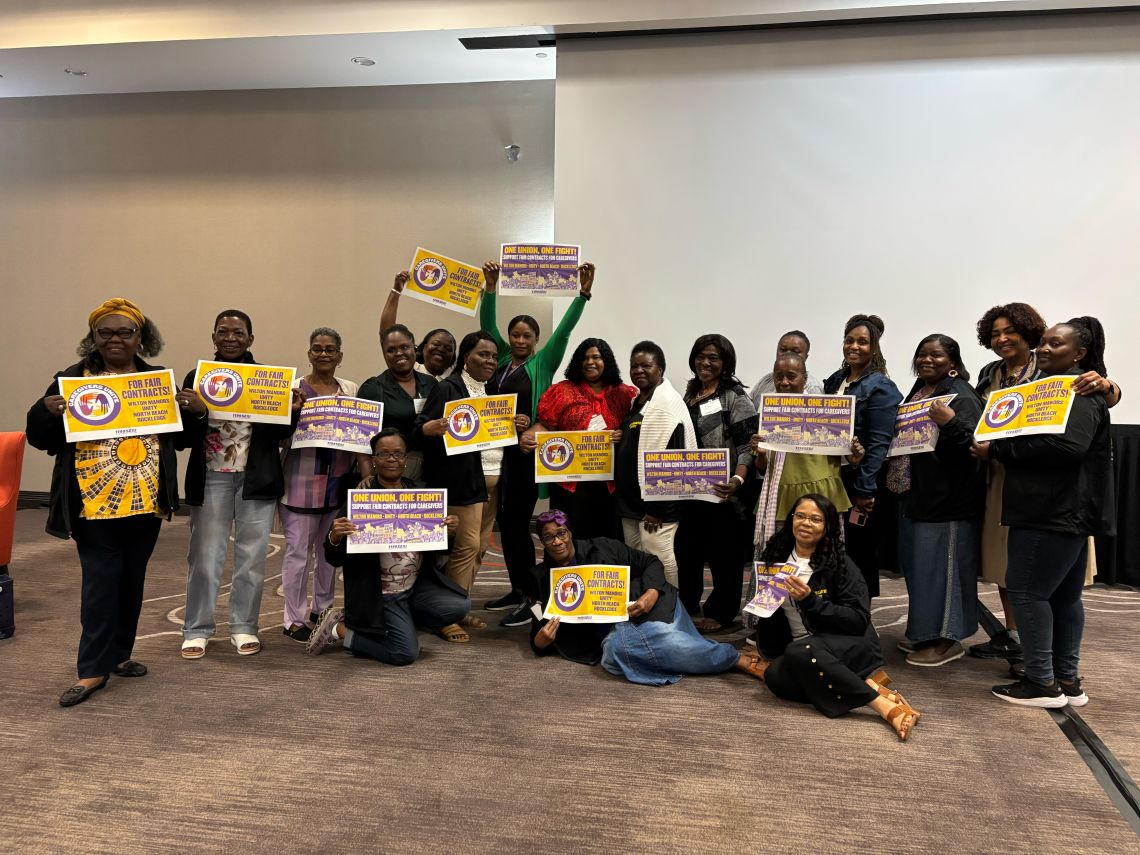

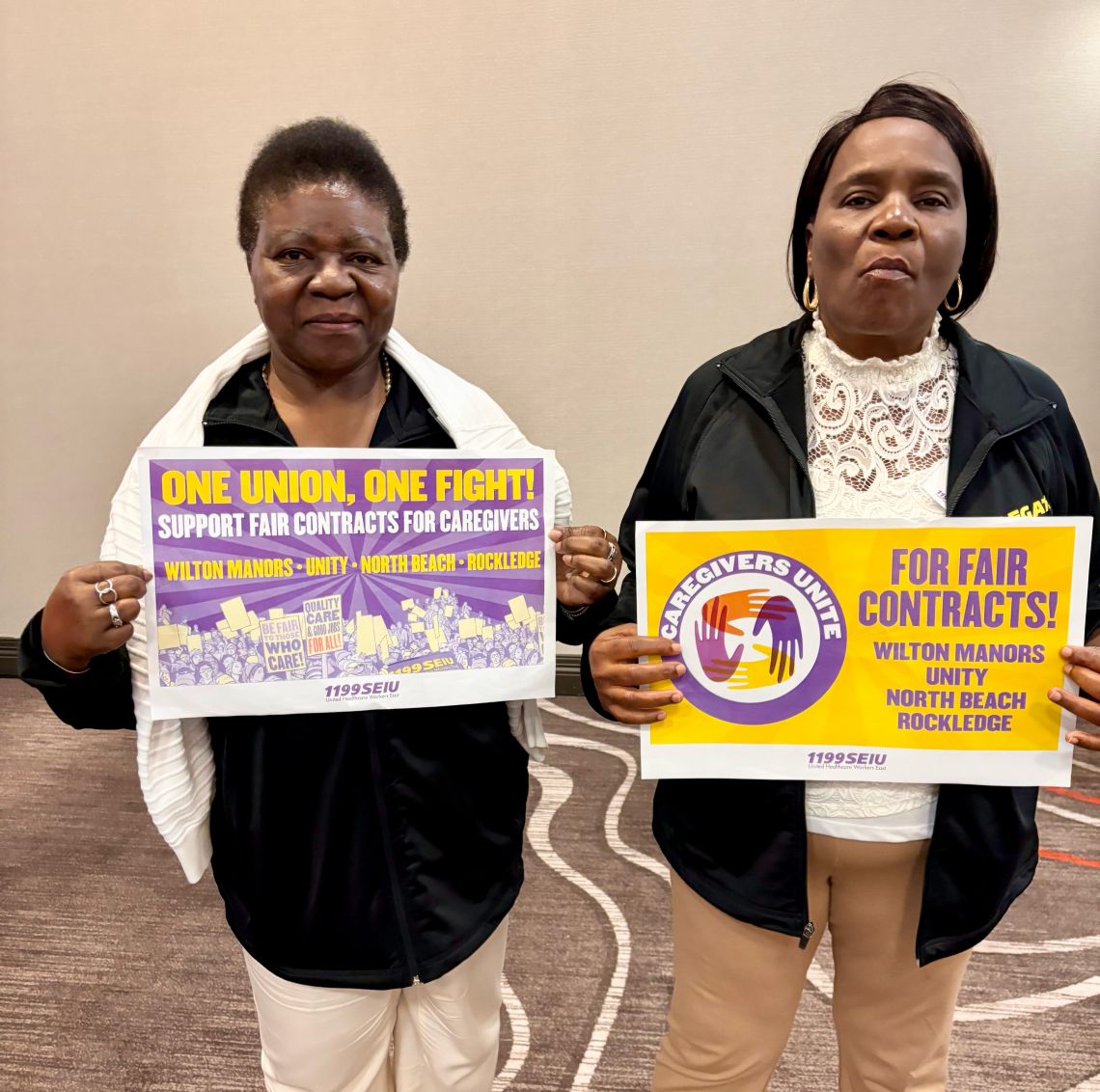
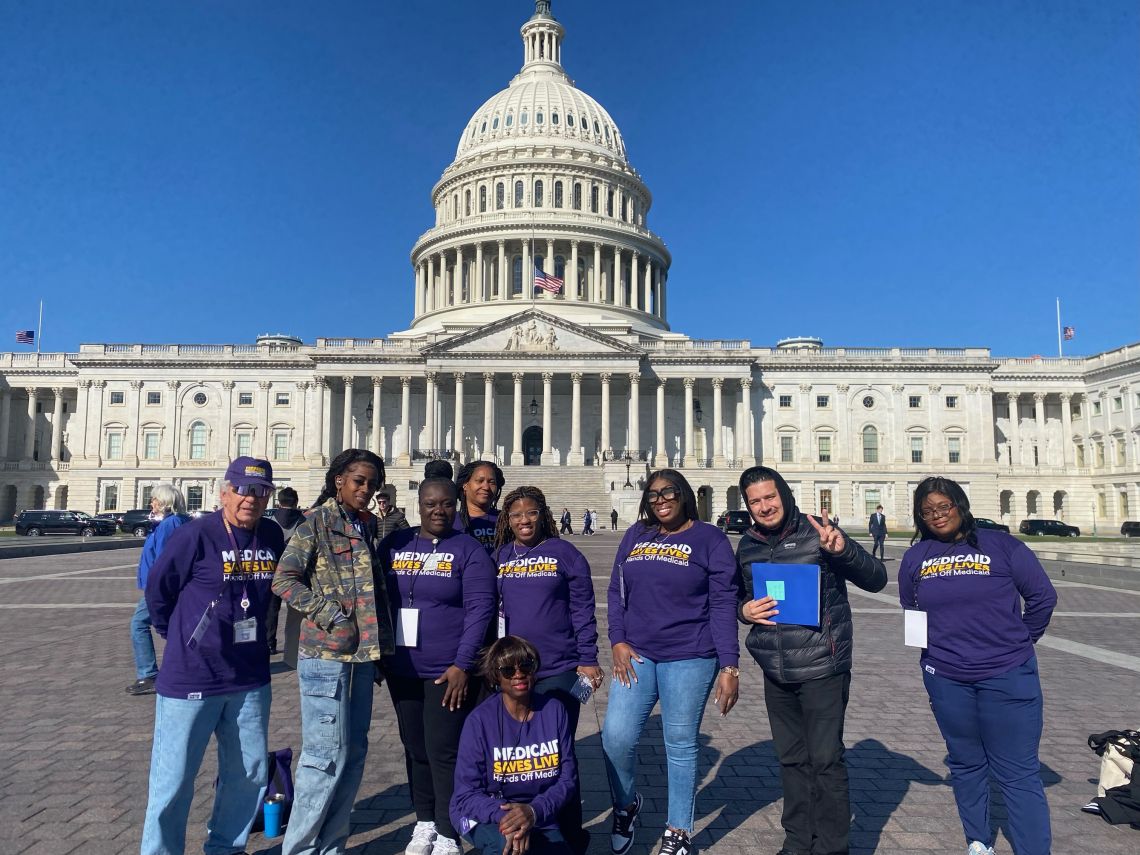
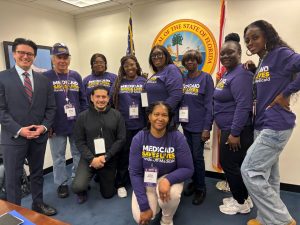 The 1199SEIU Florida contingent visited several lawmakers from Trump’s GOP. The caregivers and other workers shared personal stories and -experiences on the importance of Medicaid, SNAP and more for their patients, communities and their own families.
The 1199SEIU Florida contingent visited several lawmakers from Trump’s GOP. The caregivers and other workers shared personal stories and -experiences on the importance of Medicaid, SNAP and more for their patients, communities and their own families.
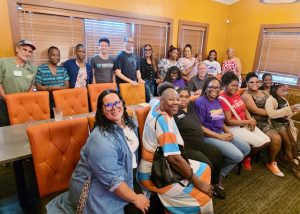 Caregivers find it especially appalling that the massive budget cuts to healthcare services and jobs would be used to fund even more tax breaks for billionaires and big business.
Caregivers find it especially appalling that the massive budget cuts to healthcare services and jobs would be used to fund even more tax breaks for billionaires and big business. 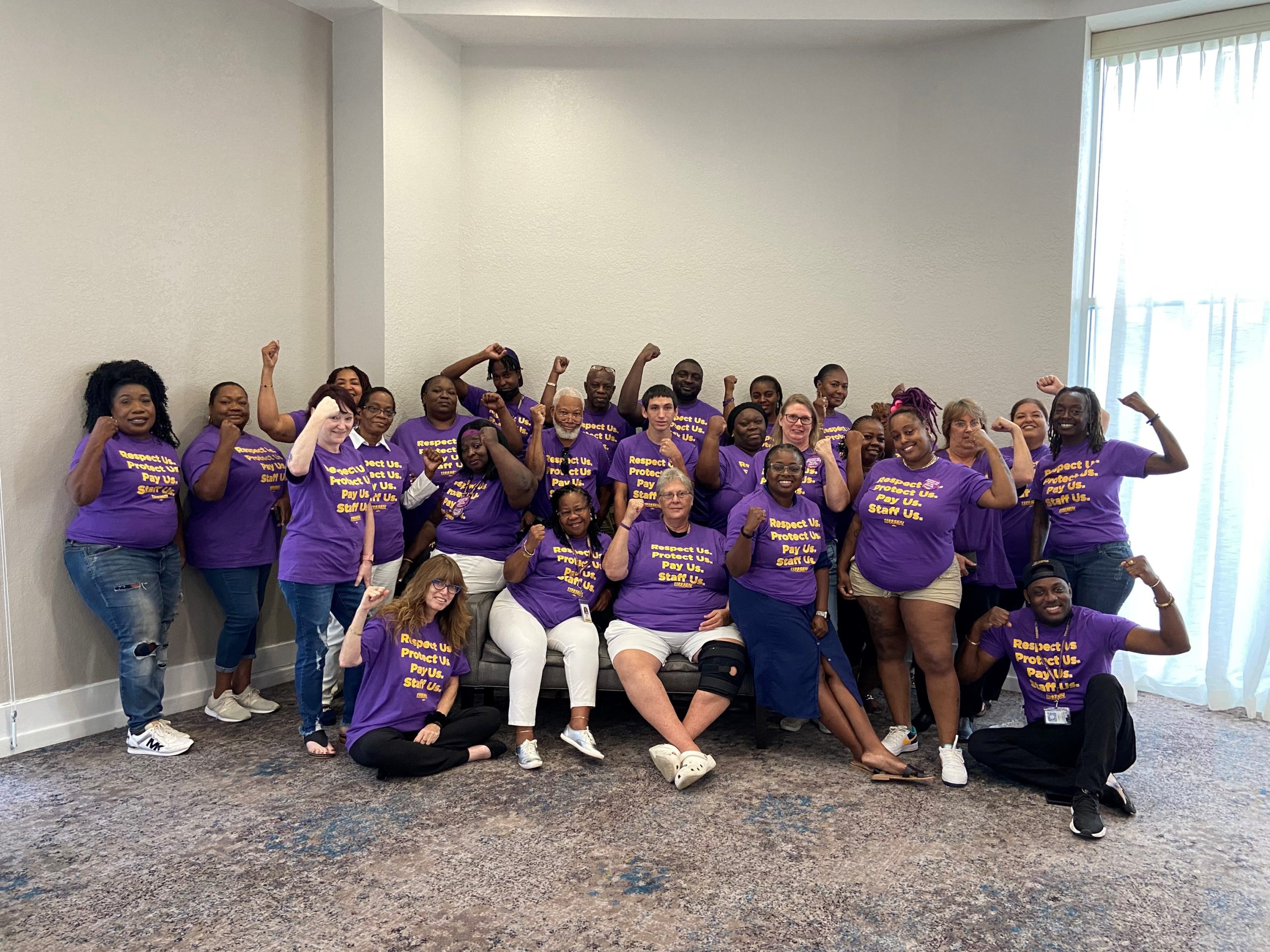
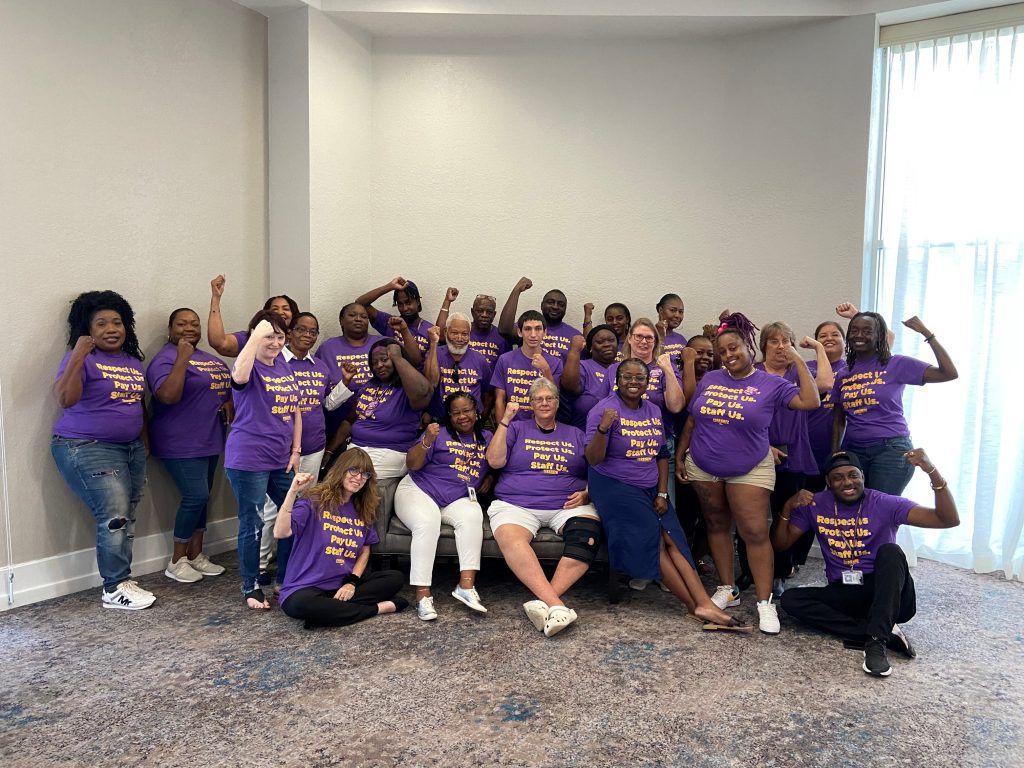 More than 1,000 Florida nursing home workers now have a new contract. It was recently ratified after months of often intense negotiations between bargaining team members with 1199SEIU United Healthcare Workers East, the largest union representing healthcare workers in Florida and nursing home owner and operator Aspire Health Group, one of the biggest companies in the industry.
More than 1,000 Florida nursing home workers now have a new contract. It was recently ratified after months of often intense negotiations between bargaining team members with 1199SEIU United Healthcare Workers East, the largest union representing healthcare workers in Florida and nursing home owner and operator Aspire Health Group, one of the biggest companies in the industry.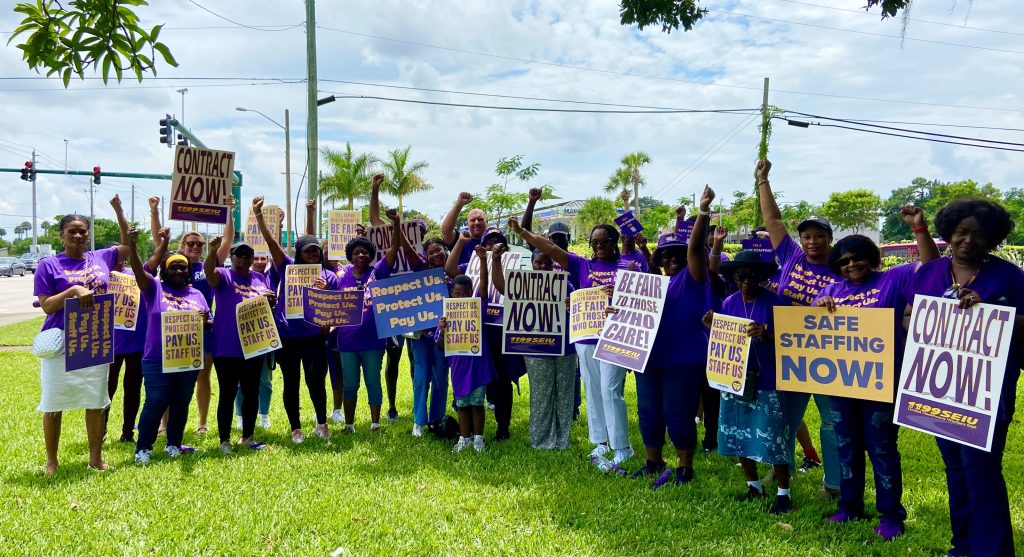 “We had pickets at all 11 Aspire nursing homes. Hundreds of workers and supporters braved the hot sun and rain outside of these facilities in Central and South Florida to make their
“We had pickets at all 11 Aspire nursing homes. Hundreds of workers and supporters braved the hot sun and rain outside of these facilities in Central and South Florida to make their